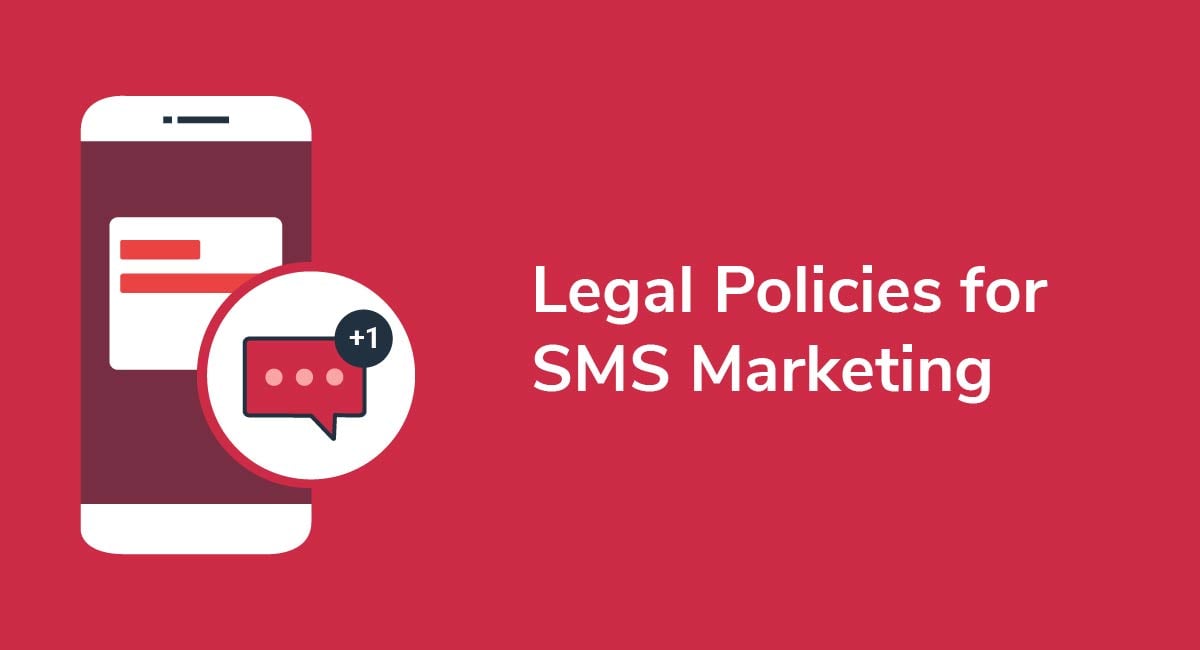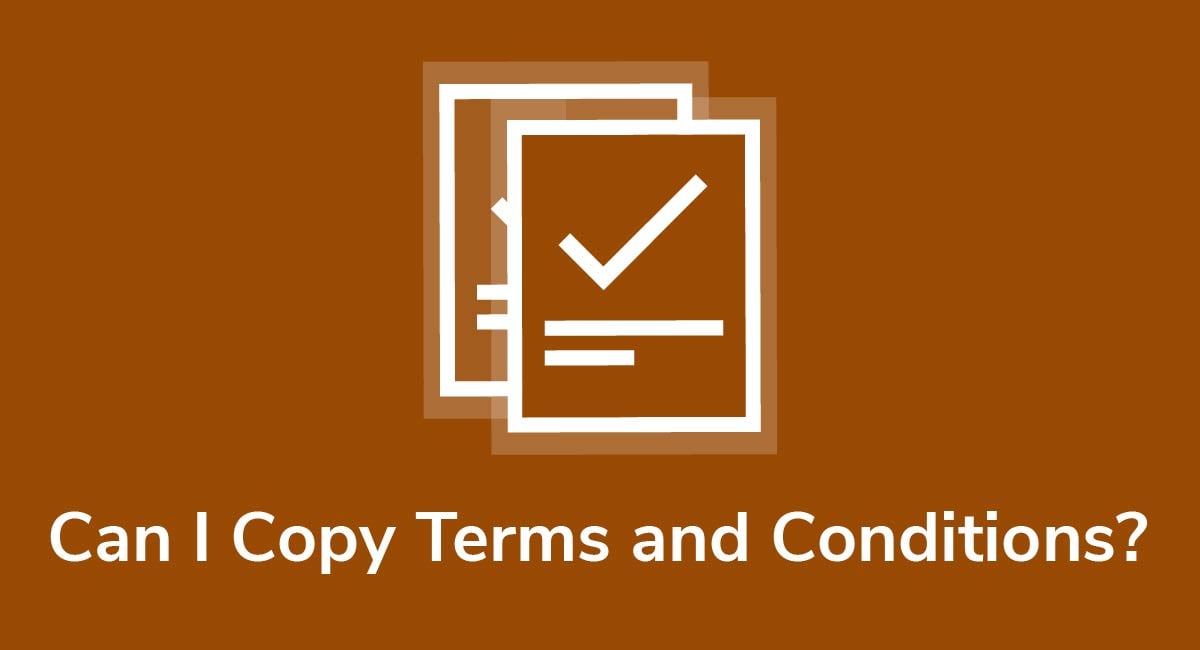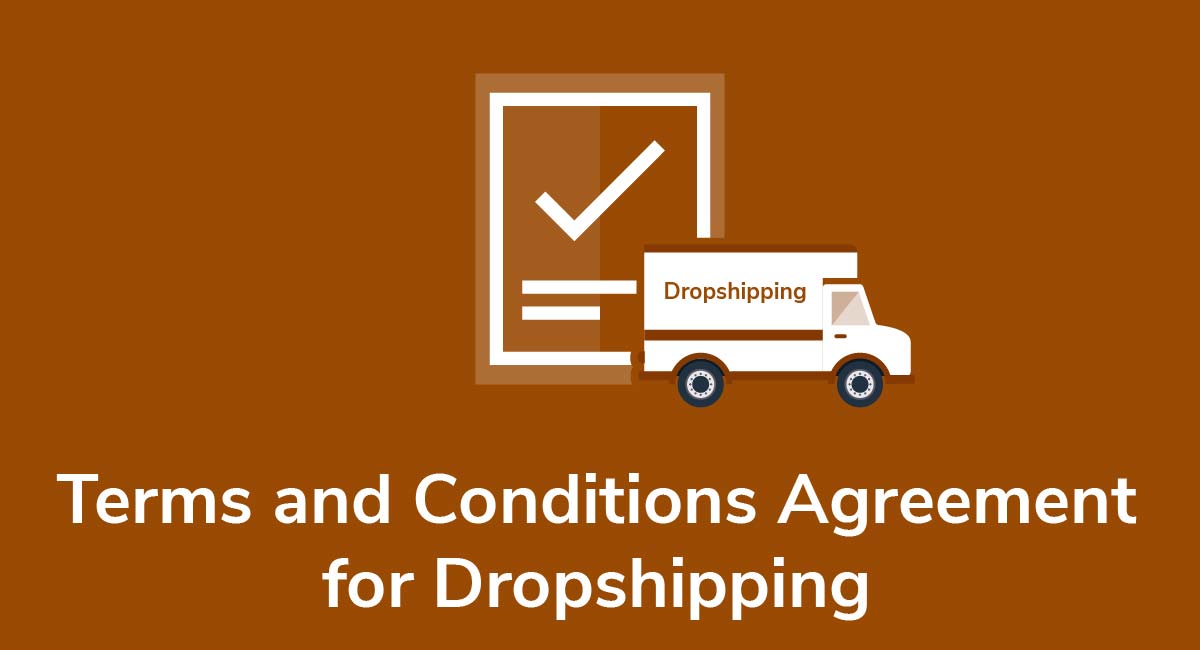EULA versus Terms and Conditions
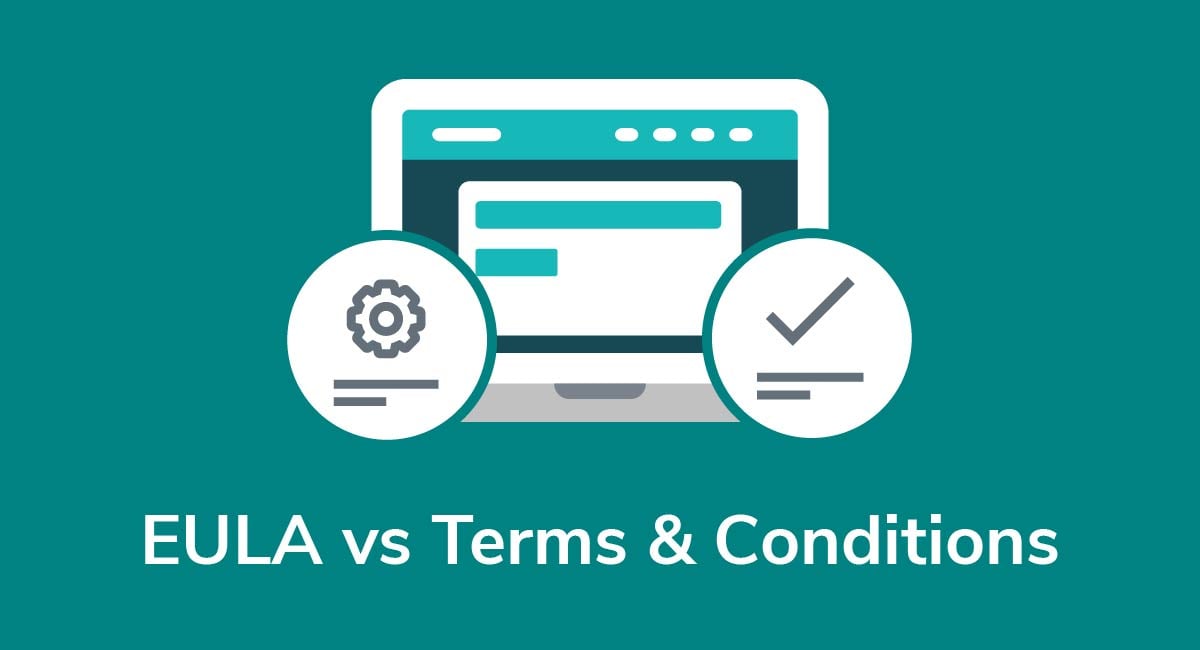
If you're a software developer or offer goods and services online, you'll need both an End User License Agreement (EULA) and a Terms and Conditions agreement (T&C).
A Terms and Conditions agreement and an EULA are both legally enforceable contracts, so long as both parties:
- Understand what they're agreeing to, and
- Know that they're entering into a contract
An EULA and Terms and Conditions:
- Reduce the likelihood of a legal issue arising
- Make it easier to resolve those disputes if they do arise
- Ensure that software developers retain full ownership of their technology
EULAs and Terms and Conditions have a lot in common, but they are very different documents. Let's compare and contrast each against the other.
Get compliant today with PrivacyPolicies.com
Select one of our generators to create the required legal agreements for your business:
- Our Privacy Policy Generator can help you generate a customized Privacy Policy in around three minutes, for free.
- Our Terms & Conditions Generator can help you generate a customized Terms & Conditions agreement in around three minutes, for free.
- Our EULA Generator can create a customized End-User License Agreement for your mobile or desktop app.
- Our Cookies Policy Generator can create a customized Cookies Policy to help your compliance with ePrivacy Directive and GDPR.
- Our Disclaimer Generator can create a disclaimer or disclosure for your website.
- Our Return & Refund Policy Generator can help your ecommerce store by creating a returns or refunds policy.
Integrate a free Cookies Notice and Cookie Consent banner to comply with the EU ePrivacy Directive and the new GDPR law regarding cookies.
- 1. What is an EULA?
- 2. What's a Terms and Conditions Agreement?
- 2.1. Does My Company Need Both an EULA and a T&C?
- 3. EULA Clauses versus Terms and Conditions Clauses
- 3.1. Introduction and Effective Date
- 3.2. Jurisdiction
- 3.3. Contact Details
- 3.4. Links to Other Policies
- 3.5. Warranties
- 3.6. Limitation of Liability
- 3.7. Restricted Use
- 3.8. Permitted Use
- 3.9. User Behavior
- 3.10. Copyright
- 3.11. Account Termination
- 4. Conclusion
What is an EULA?

An EULA is a formal legal agreement between a customer, also known as the end user, and the software developer, or licensor.
Usually in exchange for payment, a customer receives a license to use your software. Your EULA helps to ensure that you retain full ownership rights and control over the software.
Companies often place links to their EULAs in the "Legal Documents" section of their website, like Ubisoft:
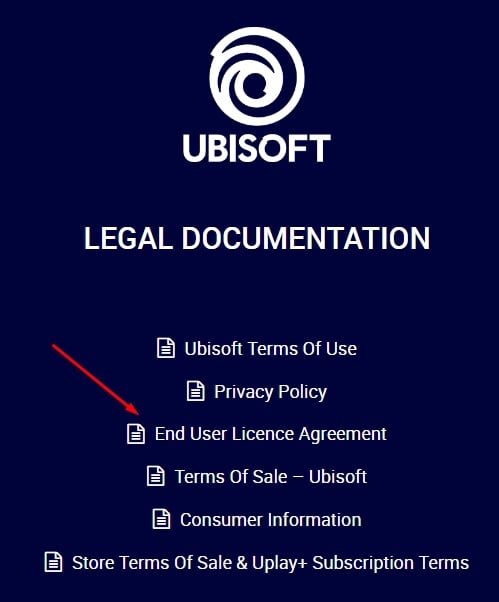
The EULA will also be presented at the point where users can download the software or app, like King does here in its Apple App Store listing:
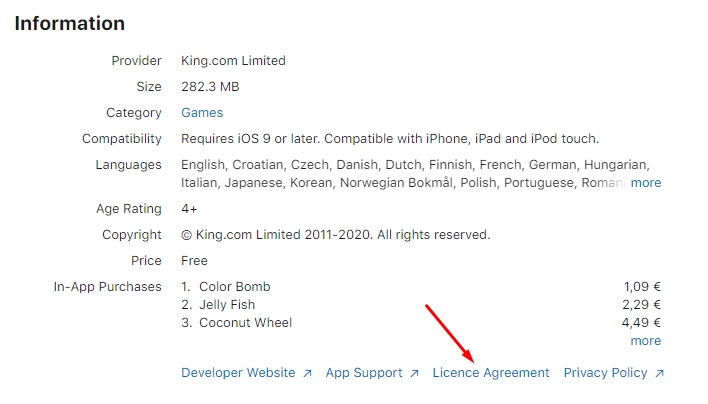
The EULA should be presented or at least linked at the time the software or app is actually being installed.
Here's how Opera presents its EULA and gets users to accept its terms before continuing to access the app:
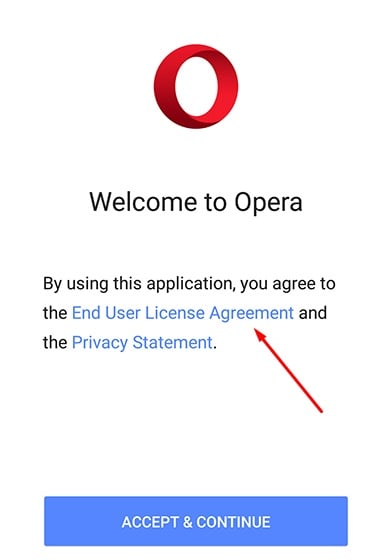
The point is to place a link where it's most relevant and end users are most likely to see it both before and after installing your software or downloading your app.
So, what's in an End User License Agreement?
- Introduction: A clause explaining the nature of the agreement
- Copyright and Intellectual Property Rights: A few clauses explaining that you own the IP rights in the software
- Limitation of Liability: Clause(s) stating where your liability ends
- Disclaimers: A statement that you can't guarantee that your software meets end user's expectations
- Governing Law: Which country's laws regulate the agreement
- Right to Terminate the agreement: You retain your right to terminate software licenses at any time
- Authorized Use: What end users can do with your program
- Unauthorized Use: What they can't use your program for
What's a Terms and Conditions Agreement?

Terms and Conditions agreements form the basis of a legally binding contract between you and your site users. Users agree to follow your rules, and in exchange you offer them access to your website and services.
Need Terms and Conditions for your business? We can help you generate a customized Terms and Conditions agreement in around two-three minutes for free. Try our Terms and Conditions Generator and just follow these steps:
- Click on the "Create your Terms and Conditions today" button.
- At Step 1, select the where will you use your Terms & Conditions and click "Next step":
- Add information about your business:
- Select the country and continue to the "Next step":
- Answer the questions about your business practices and click "Next step" when finished:
-
Enter your email address where you'd like your agreement sent and click "Generate."

You're done! Now you'll be able to instantly access and download your new agreement.
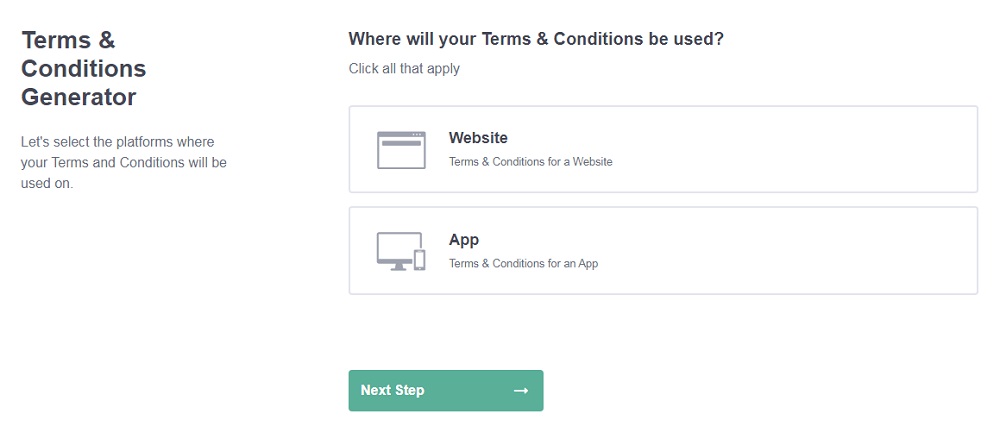
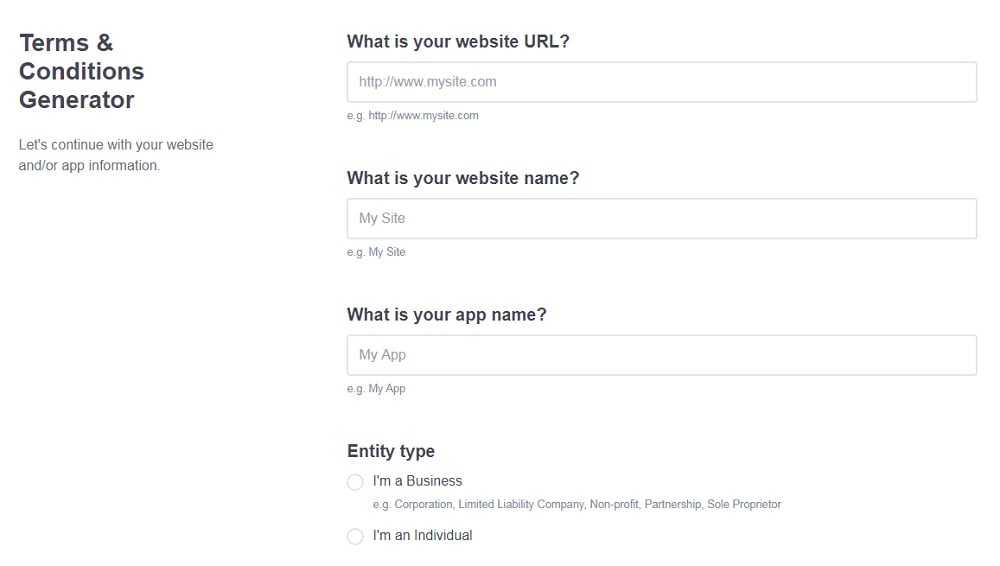
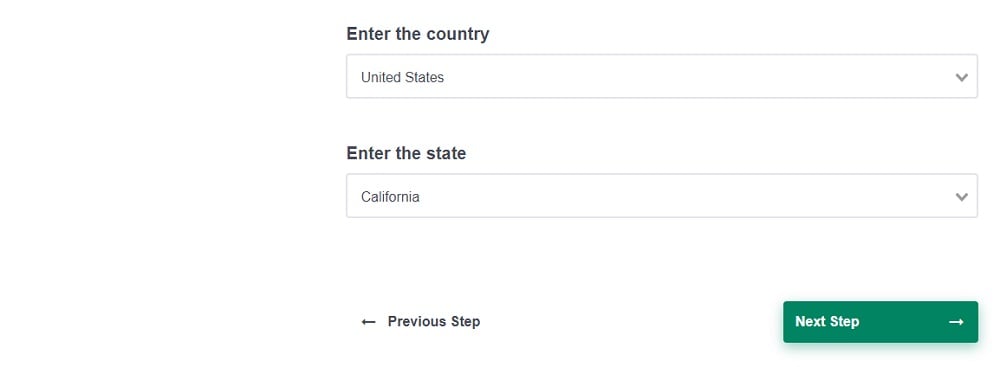
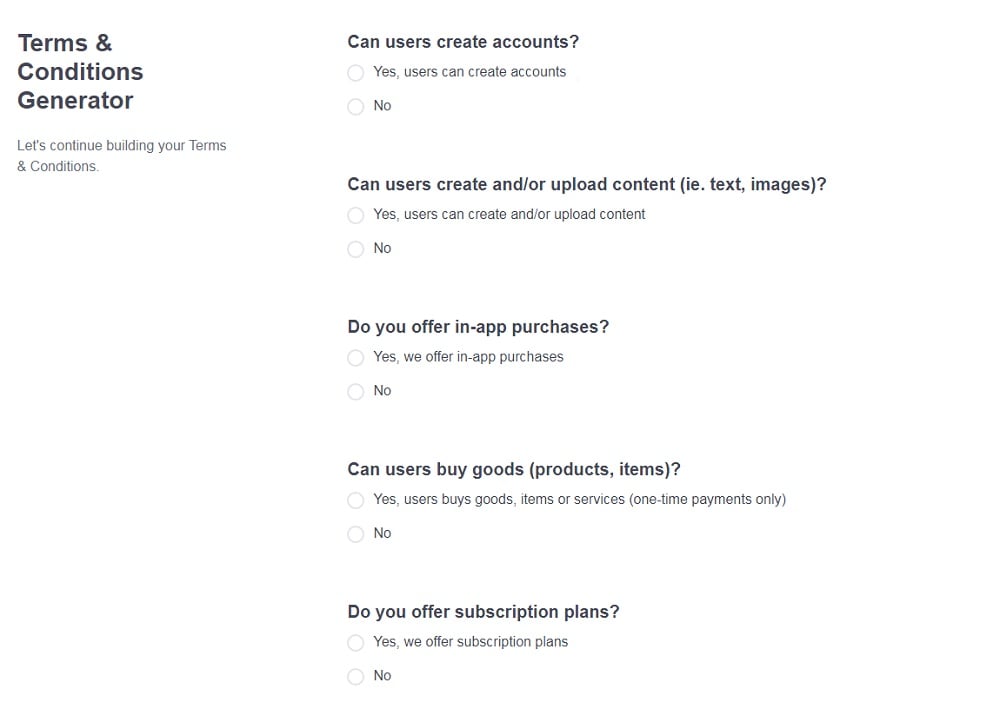
This is more comprehensive than offering them a software license, so Terms and Conditions agreements cover far more information than an EULA does.
Most companies have Terms and Conditions. You'll also see them referred to as:
- Terms of Use
- Terms
- User Agreement
- Acceptable Use Policy
- Terms of Service
Here are some examples.
Ubisoft puts a link to its Terms in the website footer:
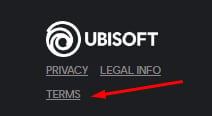
Businesses will ask users to agree to the Terms and Conditions before they set up an account on a website, like Waterstones does here:

Or at the checkout screen, as with Bulk Powders:

Terms and Conditions agreements are central to running a website and providing goods or services online. Why? Because they cover pretty much the entire agreement between you and the end user or customer.
Very briefly, here's what a T&C will cover:
- Governing Law: The law governing the EULA will also govern the Terms and Conditions.
- Disclaimers: E.g. how you're not responsible for what happens if anyone relies on the information posted on your website, or what happens if a user clicks a third party link.
- Liability Limitation: You won't be held responsible for incidental and consequential damages, and if you're held responsible, you'll only pay up to a certain amount.
- Rules for Account Termination: These clauses define when you can delete someone's account, and why.
- Permitted and Restricted Use: What users can do with their account, how they're allowed to interact with others, and what constitutes unauthorized behavior.
- How to Register for an Account: Rules setting out how someone can register for an account on your website.
Like an EULA, a Terms and Conditions agreement aims to reduce the likelihood of a legal dispute arising between the user and the developer or business owner. But where the EULA covers software disputes, the Terms cover website, content, and service disputes.
Does My Company Need Both an EULA and a T&C?

If you have an EULA, you should also have a Terms and Conditions agreement. Remember, an EULA only specifies how users can use the software license they purchase from you. It doesn't cover all the contractual terms. You need the Terms and Conditions for this.
However, if you aren't doing any sort of licensing, you likely won't need an EULA and will just need a T&C.
Here's an easy way to remember the distinction between these two agreements:
An EULA sets out what end users can and can't do with your software.
A Terms and Conditions agreement set out what services you agree to offer the end user and how you expect them to behave in return.
So, if an EULA is not the same thing as Terms and Conditions, what do they look like, and how do you know which clauses to put in which document?
EULA Clauses versus Terms and Conditions Clauses

Since there are so many similarities between EULAs and Terms and Conditions agreements, let's simply work through the general clauses you'll find in both agreements and highlight the similarities and differences as we go.
Introduction and Effective Date
Every agreement should specify:
- What it is i.e. a contract
- When it comes into effect
Ubisoft's Terms of Use specifies that it's an agreement between the Ubisoft family and affiliates and each user. It also includes the last revised date at the top of the agreement:

A clause like this in an EULA will be quite the same, since it's also an agreement between the company and the end user.
Jurisdiction
Every EULA and Terms and Conditions agreement should specify which country's laws give you a right to defend or raise a claim against the other party.
Typically, the jurisdiction will be the same for both the EULA and the Terms and Conditions.
Here's Ubisoft's EULA jurisdiction clause:

Compare it to Ubisoft's Terms of Use jurisdiction clause - you'll note that it's broader in scope and covers not just the software license but the services as a whole:

Contact Details
Both agreements will have clauses setting out how users can contact the company if there are issues. These clauses will always tend to be basically the same across all agreements.
The Ubisoft EULA contains an email address which customers can use if they have questions about the EULA:
![]()
You can contact a different support department if you have questions about the Terms of Use:
![]()
Links to Other Policies
Your End User License Agreement should refer to your other policies, such as your Terms and Conditions.
By incorporating these agreements into your EULA, you're reminding users that they're bound by more than just the End User License Agreement and that the Terms and Conditions are also at play.
Here's an example from Apple's EULA. Using iTunes means agreeing to the iCloud Terms and Conditions - if the user won't agree to these Terms, they can't use iTunes in this way:

Spotify has a great clause for incorporating terms into its EULA. To download Spotify software upgrades, users must agree to the website's general Privacy Policy which is linked to within the EULA.
This keeps the EULA short and easily readable, while giving users the information they need to make an informed decision - in other words, it's a perfect balance:

Compare this to Spotify's Terms and Conditions.
Within the Terms, Spotify links to its various other policies, which form part of the wider agreement:

Again, remember that Terms and Conditions agreements have a broader scope than EULAs.
Warranties
End users should know that they're downloading software at their own risk. So, your EULA should specify that:
- End users assume responsibility for what happens when they download your product
- You can't promise that your app is 100% virus or malware-free, and
- It's the end user's job to ensure that the app is suitable for their needs
In other words, it's not your fault if the app doesn't meet their expectations.
Here's an example from Rockstar Games. The licensor (software developer) isn't responsible for the end user's expectations and can't promise the app runs perfectly 100% of the time:
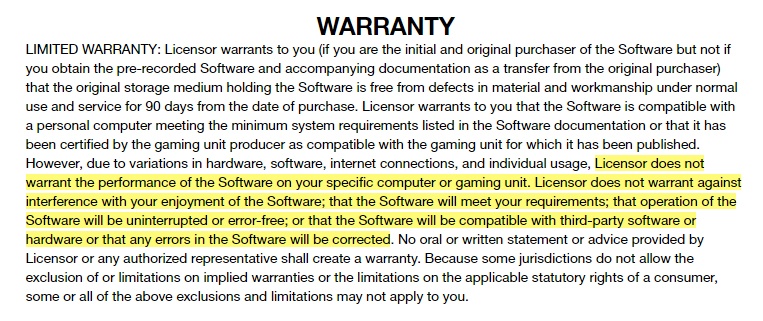
Compare this to a Terms and Conditions warranty from Apple. You'll note it's far broader and covers the website and its contents rather than just the software product.
So, Apple can't guarantee that its website or other services will run perfectly, or meet expectations:
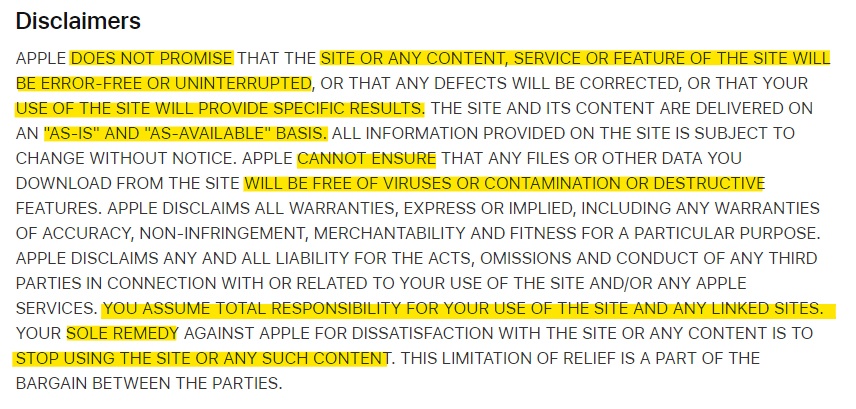
Limitation of Liability
An EULA should limit your liability for what happens if an end user downloads your software and suffers:
- Financial or reputation loss
- Personal injury
- System malfunction or damage
While you can't erase all liability, you can and should limit it to what's reasonable.
Here's an example from Huawei:
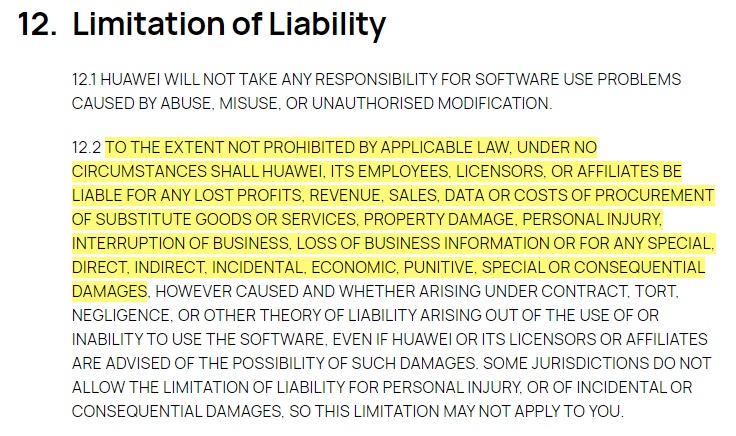
Similarly, your Terms and Conditions should restrict your liability to what's reasonable for damage incurred by using the site or engaging with its content.
Again, this is broader than the EULA, but the general principles are the same. For example, here's how Apple limits liability for damage connected to the site or any of its content:
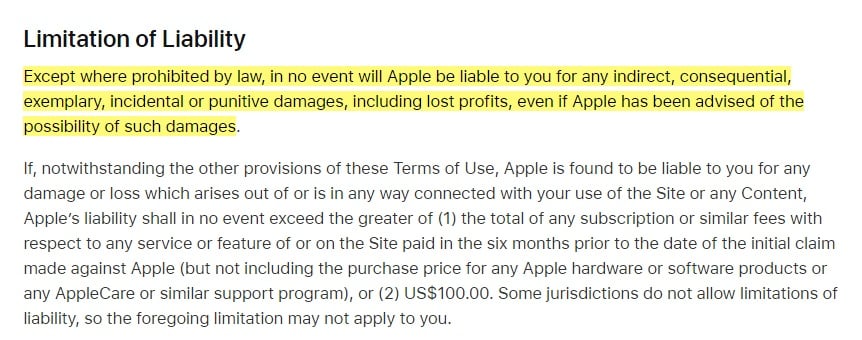
Restricted Use
When drafting Terms and Conditions, you should restrict what users can do to your website or use their accounts for. So, make it clear that users can't, for example, tamper with your website coding or use their accounts for illegal purposes.
For a good example, look at how Huawei handles this:
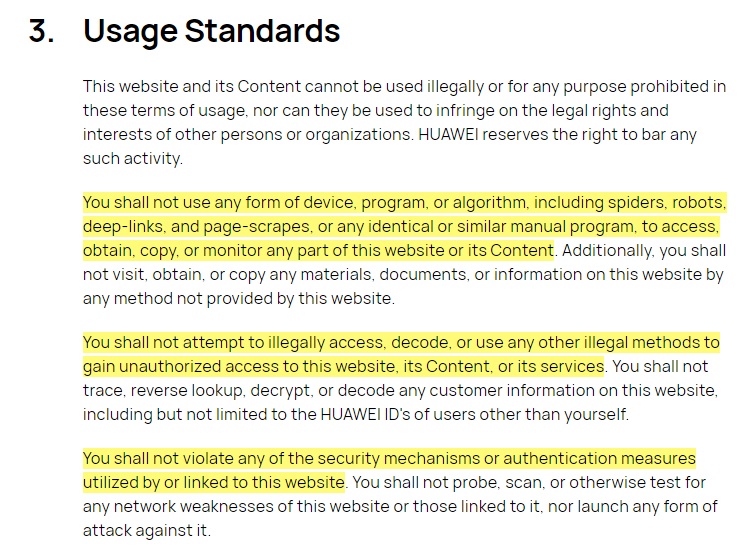
Compare this to Huawei's EULA, which prohibits end users from misusing or engineering the software rather than the website. They shouldn't use any part of the software IP to engineer their own software, either:
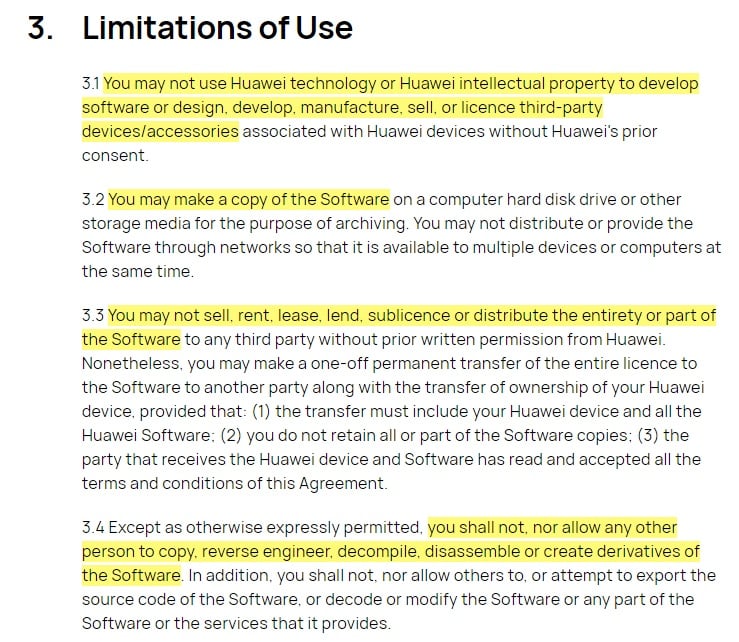
Permitted Use
Since an EULA doesn't give end users ownership rights, it's important to specify what they can actually do with the app or software.
An End User License Agreement permitted use clause will often set out that users can only operate the app for personal, non-commercial reasons.
All you really need is a simple clause, like Spotify uses. This clause makes it clear that the platform can only be used for "personal, noncommercial purposes" and those in line with the terms in the agreement:

In its Terms of Service, Pinterest sets out with much more detail who can use the platform and establishes that users must always provide them with accurate information:
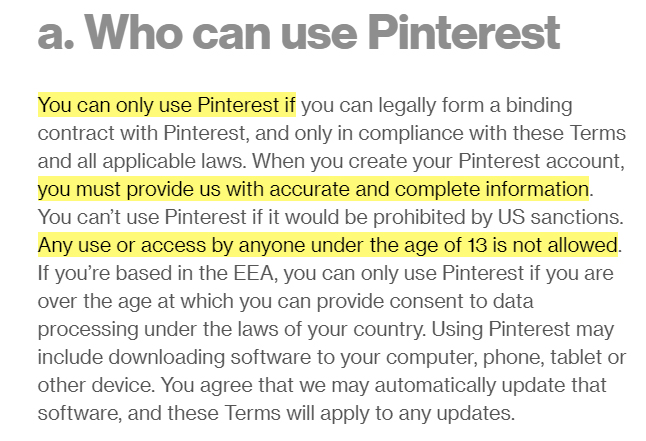
Pinterest also has a great clause for explaining what the platform can do with user content. Why is it great? Because it's summarized it in very simple language which makes it easier for the average user to understand:
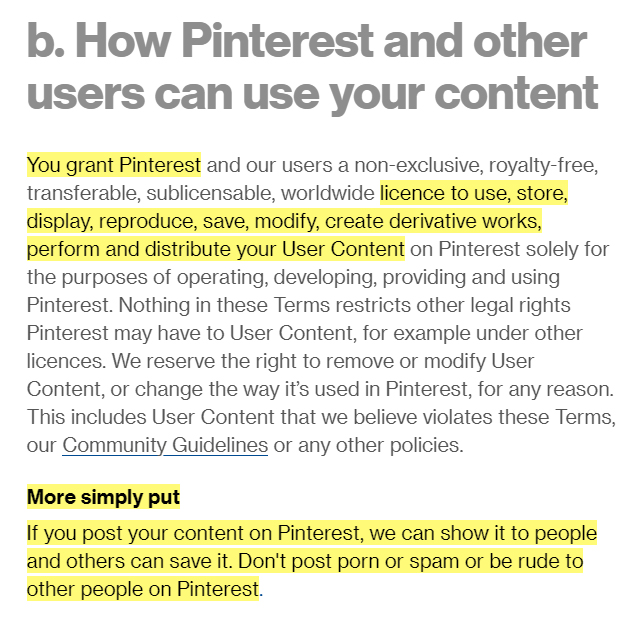
User Behavior
Be clear that users must behave in a certain way to use your app or platform.
In a Terms and Conditions agreement, you should explain that users take full responsibility for what content they upload, and that it's unacceptable to bully, harass, or intimidate others.
Here's an example from Spotify:
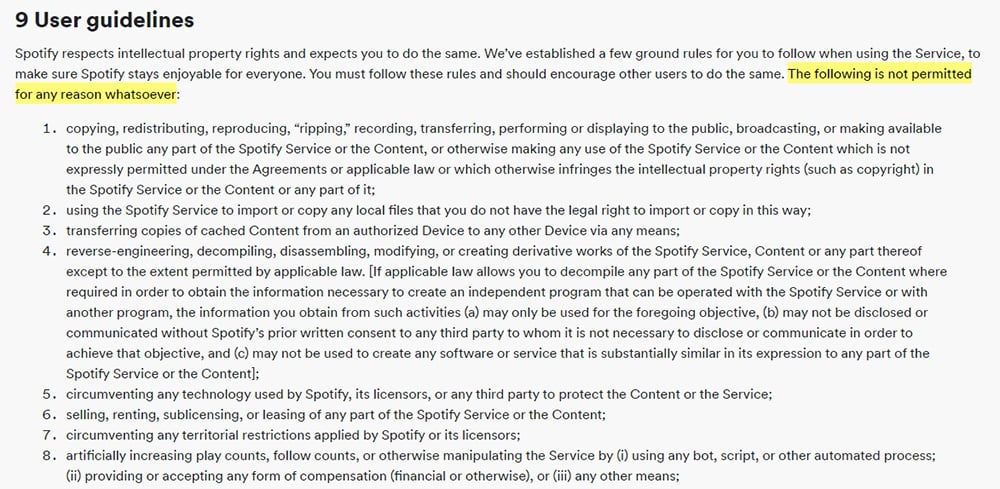
For an EULA, set out that you can't use the app to harass others or transmit unacceptable content.
Let's look at the Ubisoft EULA. The only real difference from a Terms and Conditions clause is that it refers specifically to app-based behavior:
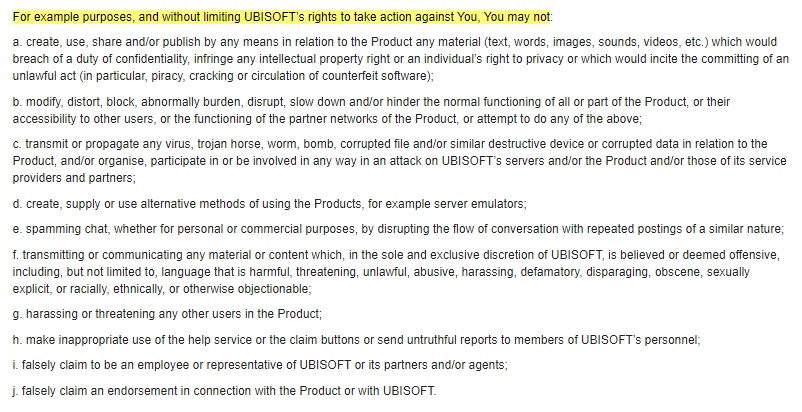
Copyright
Your Terms and Conditions should protect your website and content from copyright infringement. You want to protect content including sounds, trademarks, coding, pictures, and logos. It also covers how the content is arranged on the website, and how it's designed.
Here's an example of a good copyright clause from Apple's Terms of Use:
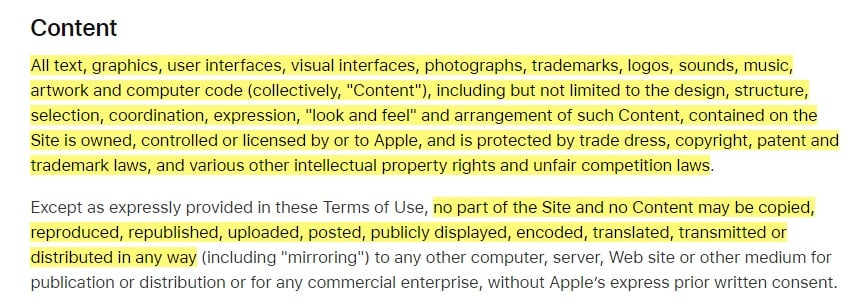
An EULA IP clause, on the other hand, is designed to protect your app or software's intellectual property rights rather than the whole website.
Nintendo, however, extends its Animal Crossing copyright clause to cover the Nintendo brand, not just the app. This is a good strategy:

Importantly, your EULA should also highlight that a license does not give the end user ownership rights of any kind.
Here's an example from Ubisoft. It ends the comprehensive IP clause, which protects the application, with a line confirming that a license does not equal ownership rights:

Account Termination
With an End User License Agreement, you can revoke an end user's license at any time. You can do this if the end user breaks the rules set out in the Agreement.
Apple reserves the right to revoke someone's iTunes license if they breach the Agreement terms. The user must also delete all traces of the software from their devices:

In contrast, the Terms and Conditions should include a clause confirming your right to terminate someone's access to your services, not just the license.
Like Apple does in its Terms of Use, you can use this clause to restrict someone's access to your website and account services:

Conclusion
An End User License Agreement (EULA) and Terms and Conditions (T&C) are both legally binding contracts. Many websites should have both.
An EULA is the agreement between someone who downloads software (the licensor, or end user) and the developer.
A Terms and Conditions agreement is between the service provider and the end user.
Although they have many similar clauses, you'll note that the EULA only covers terms relating to the software or app download. The Terms and Conditions, however, is far wider reaching, and regulates the entire agreement between both parties, from the moment a visitor lands on the homepage, to the moment they download any software, or purchase an item through an ecommerce store.
